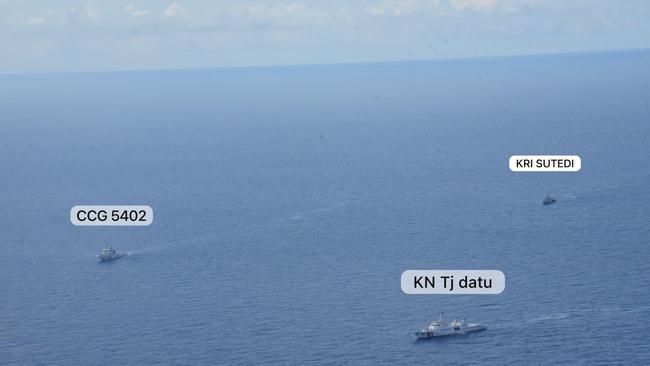China tests Prabowo’s mettle with early salvo
Beijing has wasted no time testing the resolve of Indonesia president Prabowo Subianto, forcing the government to dispatch vessels to eject a Chinese coastguard ship from its maritime waters in the South China Sea on its first day in office.

Beijing has wasted no time testing the resolve of Indonesia president Prabowo Subianto, forcing the government to dispatch vessels to eject a Chinese coastguard ship from its maritime waters in the South China Sea on its first day in office.
Monday’s incident appears to be an early salvo by China, which has a history of testing new administrations over its claims to the resources-rich waters through which more than a third of the world’s maritime trade passes.
President Prabowo, a former defence minister and special forces commander, was only sworn into office on Sunday. In his inauguration speech he vowed to safeguard the country’s sovereignty against foreign powers.
Indonesia’s Bakamla coastguard said late on Monday it had “shadowed and expelled China Coast Guard vessel 5402, which was interfering with a 3D seismic data survey and processing operation” being carried out by state-owned oil and gas company, Pertamina in what Jakarta refers to as its North Natuna Sea.
The vessel is understood to have sailed close to Pertamina’s MV Geo Coral and ordered it to cease survey work, repeating a pattern of harassment suffered for years by neighbouring Malaysia, Vietnam, The Philippines and Taiwan, which have competing claims over islands and shoals in the South China Sea.
The incident coincided with fresh live-fire drills by the People’s Liberation Army on Tuesday morning off the coast of Taiwan, escalating already broiling regional tensions just weeks before US elections.
Last week, China also staged a one-day military training exercise in the Taiwan Strait involving a record 153 aircraft, 14 navy vessels and 12 Chinese government ships in the Taiwan Strait, prompting the US and Canada to stage a “freedom of navigation” pass through the narrow band of ocean.
Indonesian authorities confirmed a Bakamla coastguard vessel backed by navy patrol ship KRI Sutedi Senaputera 378 and a maritime surveillance plane had been dispatched over the weekend to expel the Chinese ship, and that “intensive monitoring” would continue in order to safeguard Indonesia’s sovereignty.
“Together, the two Indonesian patrol ships conducted shadowing and successfully expelled the CCG 5402 from Indonesia’s jurisdiction in the North Natuna Sea,” a Bakamla statement said, though a senior coastguard official later clarified the Chinese vessel only crossed outside of Indonesia’s maritime continental shelf midmorning on Tuesday.
Rear Admiral Andi Abdul Aziz told The Australian that Chinese coastguard vessels often entered Indonesia’s exclusive economic zone but “this time they entered the continental shelf about 23 miles in” and began harassing a Pertamina survey vessel.
“This is where we draw the line. Our survey vessel was approached and disturbed which we cannot accept so we want them out,” he said.
In video and audio footage released by Bakamla, a Chinese coastguard officer can be heard telling Indonesian crew over the ship’s radio that “China has indisputable sovereignty over the Nansha Islands and adjacent waters” – referring to the disputed South China Sea island chain better known as the Spratlys – “as well as the seabed”.
The Indonesian officer responds by asserting Indonesia’s sovereign right to the waters.
Regional security analyst Yohanes Sulaiman said the incident was more likely a case of the Chinese and Indonesian navies and coastguards pushing each other’s boundaries than an early show of force from the top.
“I think this is the tail wagging the dog on both sides. Without provocation I don’t think Prabowo will be much different to Jokowi (Joko Widodo),” he said, referring to the former Indonesian president who preferred to downplay Chinese incursions.
Raymond Powell, director of Stanford University’s Sealight project that monitors China’s “grey zone” activity in the South China Sea, told The Australian it was not unusual for Beijing to test a new government to see how it would react.
“If it can get in early it can set a precedent. That’s how the whole salami slicing works,” he said, referring to China’s geopolitical strategy of using small steps to make larger gains that would be difficult to perform all at once.
Mr Powell said China had been more reserved in its dealings with Indonesia than with Vietnam and The Philippines. “It’s interesting that at least for now China’s Coastguard ship has backed off, which is not something it does with The Philippines or Vietnam.”
But he added: “They might feel they have to do more to make sure the Indonesians don’t get any ideas. They don’t like it when you blow the horn.”



To join the conversation, please log in. Don't have an account? Register
Join the conversation, you are commenting as Logout